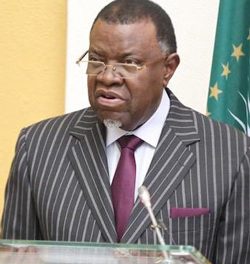
Fishrot files unlikely to sink SWAPO at the polls

By: Oxford Economics
A bribery and corruption scandal, dubbed the ‘Fishrot scandal’ by Namibian media, has forced two ministers to resign, but we expect it will not have a major impact on the country’s presidential and legislative elections due next week on 27 November.
In the wake of the scandal uncovered by the Namibian newspaper, WikiLeaks, and Icelandic media, Namibia’s justice and fisheries ministers resigned over allegations that they had awarded horse mackerel quotas to Iceland’s biggest fishing firm Samherji in exchange for bribes. The scheme also involved the local offices of a major South African investment house and a former Angolan fisheries minister sacked by President Joao Lourenco.
The scheme would allegedly generate kickbacks of US$10 million over a four year period. Justice Minster Sackeus Shanghala and Fisheries and Marine Resources Minister Bernhard Esau resigned following the media reports. President Hage Geingob accepted the resignations after meeting with the two ministers but added they were “innocent until proven guilty”. Esau denied any wrong doing and said he quit to prevent the reports from damaging SWAPO ahead of next week’s elections.
Investigations into the allegations are continuing in Namibia, Iceland and Angola. The extensive and ongoing media coverage of the Fishrot scandal, however, is unlikely to have any negative effect on SWAPO’s support in the next week’s polls. Indeed, voter apathy is a more likely cause for concern. SWAPO’s support base remains overwhelmingly rural and, in many respects, isolated from daily developments.
Meanwhile, the Southern African Development Community (SADC) observer mission of 53 personnel from eight member states began its work ahead of polls, Despite some objections and an alarming recent case of missing machines, the electoral commission said it will use the electronic voting machines at 151 polling stations in all 121 constituencies countrywide.
It is rare in the region to witness government ministers stepping down when linked to bribery and corruption allegations, so at one level the actions of Minsters Shanghala and Esau are to be commended, even if their alleged transgressions remain abhorrent. It is unlikely the two were coerced into their actions by concerns that the fallout would damage SWAPO at the pools. SWAPO’s base remains overwhelmingly rural and more out of touch with political news than their urban cousins who have taken a dimmer view of the alleged crimes. In fact, protesters in Windhoek have in the past week demanded that the Anti-Corruption Commission (ACC) director take action against those implicated in the scandal.
With SWAPO expected to romp to another overwhelming victory, the only real concerns are voter apathy and damage that this scandal with international coverage could cause to the country’s celebrated reputation as one of the least-corrupt countries in Africa.











































